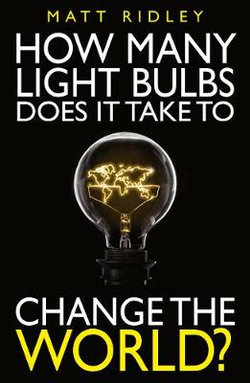Almost every schoolchild learns that Thomas Edison invented the light bulb. But did he? And if he hadn't invented it, would we be still living in the dark? Acclaimed author Matt Ridley (The Rational Optimist, The Evolution of Everything) explains that at least 20 other people can lay claim to this breakthrough moment. Ridley argues that the light bulb emerged from the combined technologies and accumulated knowledge of the day - it was bound to emerge sooner or later. Based on his 2018 Hayek Memorial Lecture, Ridley contends that innovation - from invention through to development and commercialisation - is the most important unsolved problem in all of human society. We rely on it - but we do not fully understand it, we cannot predict it and we cannot direct it. In How Many Light Bulbs Does It Take to Change the World? Ridley examines the nature of innovation - and how people often fear its consequences. He dispels the myth that automation destroys jobs - and demonstrates how innovation leads to economic growth. And he argues that intellectual property rights, originally intended to encourage innovation, are now being used by big business to defend their monopolies. Ridley concludes that innovation is a mysterious and under-appreciated process that we discuss too rarely, hamper too much and value too little.
- ISBN:
- 9780255367851
- 9780255367851
-
Category:
- Economic systems & structures
- Format:
- Paperback
- Publication Date:
-
27-02-2020
- Language:
- English
- Publisher:
- Institute of Economic Affairs
- Country of origin:
- United Kingdom
- Dimensions (mm):
- 199.39x130.3x8.38mm
- Weight:
- 0.1kg
This title is in stock with our overseas supplier and should arrive at our Sydney warehouse within 3 - 5 weeks of you placing an order.
Once received into our warehouse we will despatch it to you with a Shipping Notification which includes online tracking.
Please check the estimated delivery times below for your region, for after your order is despatched from our warehouse:
ACT Metro: 2 working days
NSW Metro: 2 working days
NSW Rural: 2-3 working days
NSW Remote: 2-5 working days
NT Metro: 3-6 working days
NT Remote: 4-10 working days
QLD Metro: 2-4 working days
QLD Rural: 2-5 working days
QLD Remote: 2-7 working days
SA Metro: 2-5 working days
SA Rural: 3-6 working days
SA Remote: 3-7 working days
TAS Metro: 3-6 working days
TAS Rural: 3-6 working days
VIC Metro: 2-3 working days
VIC Rural: 2-4 working days
VIC Remote: 2-5 working days
WA Metro: 3-6 working days
WA Rural: 4-8 working days
WA Remote: 4-12 working days





Share This Book: